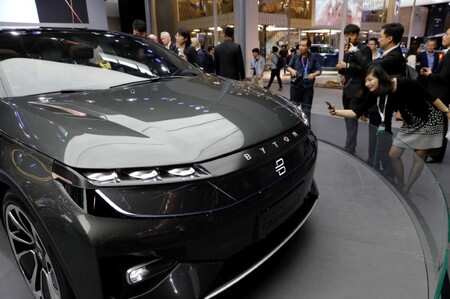
By Yilei Sun and Brenda Goh
SHANGHAI: Chinese electric vehicle (EV) maker Byton, which is facing a management shake-up and questions about funding an expansion, said it has received over 50,000 orders globally for its new SUV model and plans to start production at the end of this year.
“We plan to launch our first production car this July,” Daniel Kirchert, Byton’s co-founder and CEO told Reuters in an interview on Thursday, adding that the company aims to manufacture 10,000 units by the first half of 2020.
Byton’s backers include Chinese retailer Suning, automaker FAW and Contemporary Amperex Technology Co .
Kirchert’s comments, coinciding with the Shanghai Autoshow, come just days after chairman and co-founder Carsten Breitfeld quit Byton.
German daily Handelsblatt said Breitfeld is joining Byton’s domestic rival Iconiq. Another German publication, Manager Magazin, said earlier that Breitfeld’s looming departure was due to trouble funding its planned expansion in the Chinese market, causing tensions inside the company.
Kirchert confirmed the former chairman’s departure and said: “Byton has already got very strong resources, and there are 1,800 employees working on different areas including internet connectivity, engineering research and development.
“We are in the middle of a new round of fundraising, which will be of similar amount to B round. We aim to finish C round around the middle of this year.” Byton had raised $500 million in the series B round last year.
Byton, which runs offices in China, the United States and Germany, is one of several largely Chinese-funded EV startups betting on the benefits of local production to compete with Tesla Inc and other auto giants.
Its local rivals include Nasdaq-listed NIO Inc and Xpeng Motors, backed by Alibaba Group.
Byton aims to hit the 100,000 unit production level around 2021-2022, he said. The 10,000 and 100,000 unit marks are widely regarded as key production milestones for electric vehicle makers.
“Only by large-scale production can we reduce costs and provide affordable prices” he said.
Byton is building its first plant in Nanjing in eastern China with a planned annual capacity of 150,000 units in its initial phase.
China’s auto sales contracted for the first time last year since the 1990s amid a broader economic slowdown but sales of new energy vehicles (NEVs), which include electric vehicles, have remained a bright spot. In March, NEV sales rose 85.4 percent.